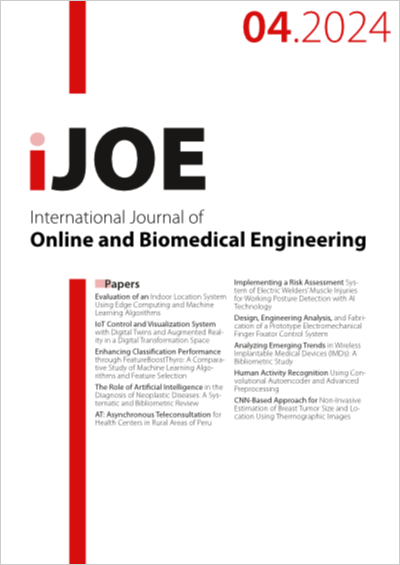The Role of Artificial Intelligence in the Diagnosis of Neoplastic Diseases: A Systematic and Bibliometric Review
DOI:
https://doi.org/10.3991/ijoe.v20i04.45429Keywords:
Artificial Intelligence, Machine Learning, Neoplastic Diseases, Cancerous Diseases, Systematic and Bibliometric ReviewAbstract
Artificial intelligence (AI) has significantly transformed the medical field, especially in the diagnosis, treatment, and management of oncological diseases. It has had a profound impact on clinical decision-making and has enhanced the quality of life for various populations. This study aims to comprehensively assess the inherent relationship between AI and medicine and to uncover both its positive and negative implications. To achieve a comprehensive understanding, a thorough systematic review of articles was conducted, examining a total of 80 papers published between 2017 and 2023. These articles were carefully selected from well-known open-access databases, such as Scopus, IOPscience, IEEE Xplore, Google Scholar, ResearchGate, and ProQuest. A key finding from this review is that the majority of research on this topic has been published in scientific journals ranked in the first-quartile (Q1), underscoring the importance and high quality of research in this field. The United States, China, India, the United Kingdom, and Canada are the foremost countries in publishing on this topic. Most of the research is published in first-quartile (Q1) journals, representing 51% of the studies. Only 1% of articles appear in third-quartile (Q3) journals. IEEE Xplore is renowned as the primary database for accessing high-impact studies in this field. Future research should prioritize investigating the long-term impact of AI on patient clinical outcomes. International collaborative research could promote innovation and fairness in the implementation of artificial intelligence (AI) in oncology.
Downloads
Published
How to Cite
Issue
Section
License
Copyright (c) 2024 Javier Gamboa-Cruzado, Hector Espinoza Villavicencio , Jefferson López-Goycochea, Luis Soto Soto

This work is licensed under a Creative Commons Attribution 4.0 International License.



